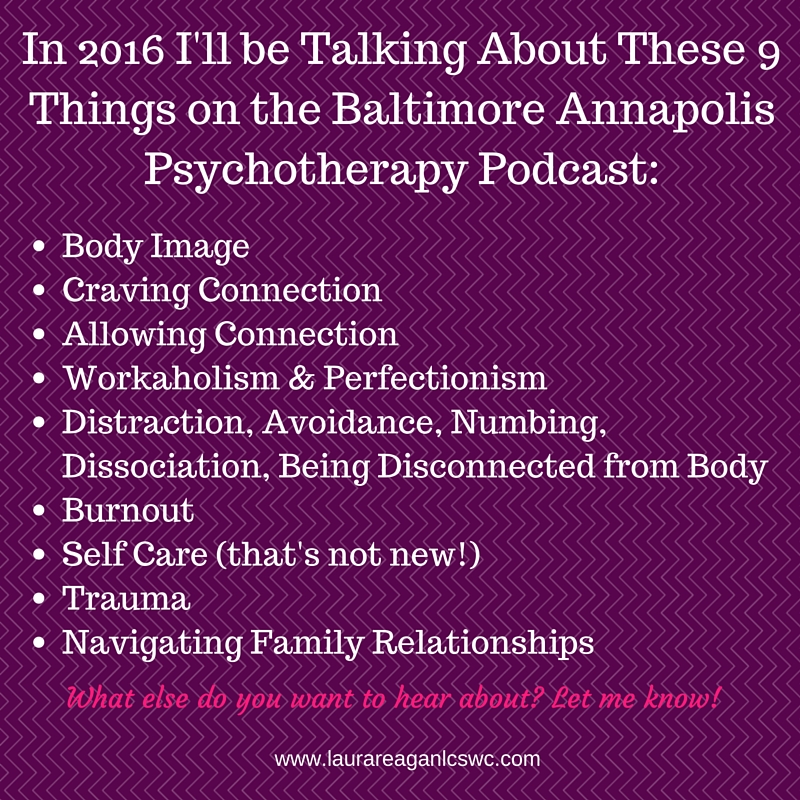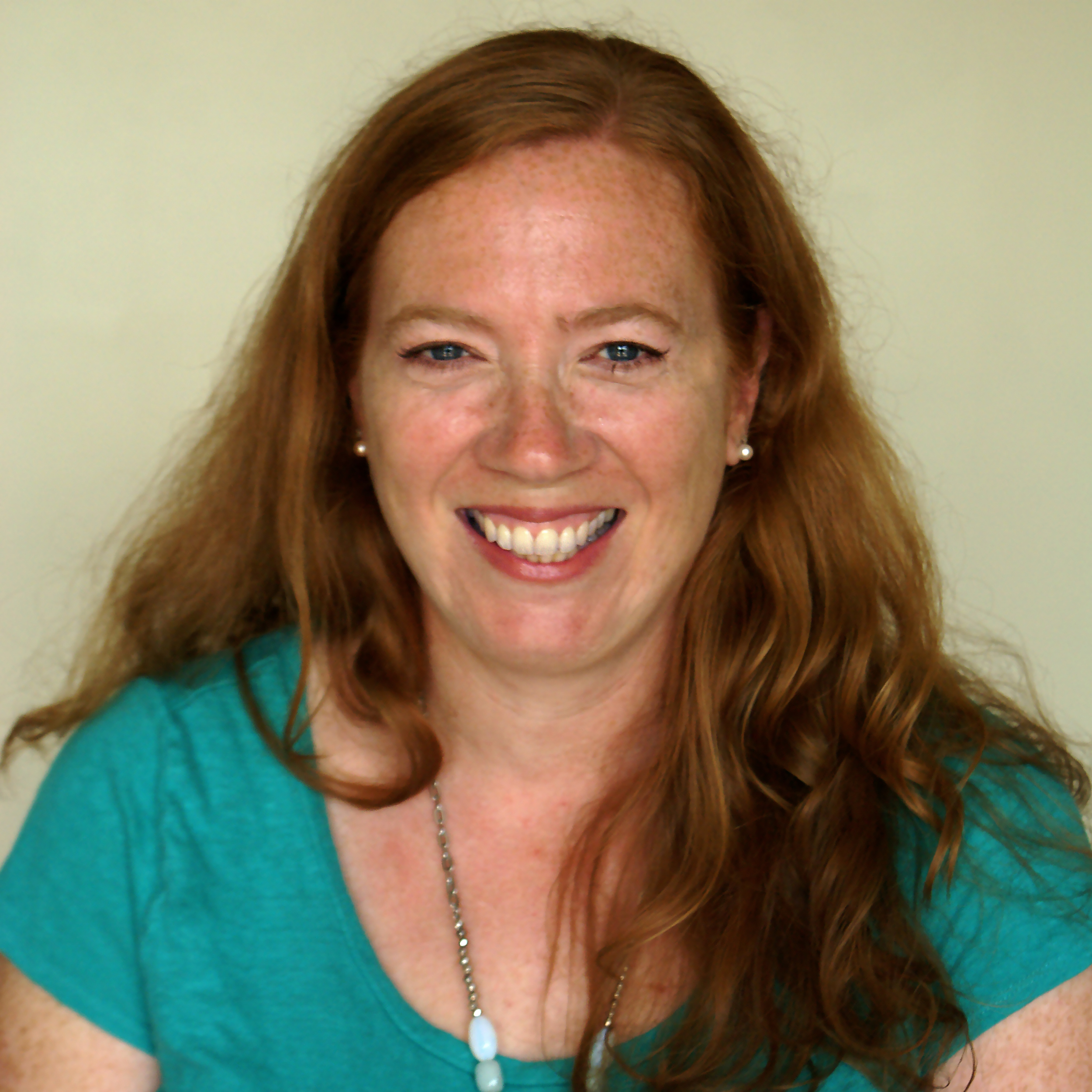At the end of the year we tend to take stock and notice themes. In the beginning of the year we tend to plan and look ahead. So I've taken stock and looked ahead. CLICK HERE OR ON THE IMAGE BELOW TO LISTEN TO PODCAST EPISODE #17!
Over the past year there have been certain themes that have been really prevalent in my practice and because of that I want to talk about them more on the podcast in the year ahead. There are several big issues - I actually made a list - and came up with the nine things that have been common themes in my practice this year and I feel will be important to discuss on the podcast in 2016.
The first theme that’s really been prevalent in my practice is body image. Men, women and children in my practice talk about wanting to have a more loving relationship with their bodies. As you may know, most people I work with have experienced trauma. I think there is a link between healing trauma and having a loving relationship with one’s body, because we know trauma is stored in the body.
A second theme which has been really prevalent in my practice over the past year is craving deep, meaningful and authentic connection. I live in a wonderful community where people tend to gather with neighbors and friends and people are very kind, but relationships tend to stay at a surface level rather than delving into feelings. People say they wish for friendships in which they feel truly seen and heard. I will discuss this more on the podcast in 2016.
Along with the theme of craving connection there’s also a theme of allowing connection. The problem is not feeling comfortable letting people in - and again, I work with a lot of people who have experienced trauma, so trust is often a major issue. When you’ve experienced relational trauma somebody has hurt you and it gives you a different perspective on whether or not it’s okay to trust people. So naturally, allowing people to really know you - showing up and being seen as who you really are - can be a challenge for people who have experienced trauma and that’ll be something I’ll be talking about more in the year ahead.
The next theme I identified that I want to talk about is workaholism and perfectionism. Here in the DC/Baltimore area we are working, working, working, working, working, working, doing, doing, doing, never wanting to slow down. It never seems like enough. It can be really hard to make time for oneself - including for therapy appointments - if you feel that without you at work something is going to fall apart. Another theme that goes along with that is being distracted, avoiding, numbing, dissociating, being disconnected from your body. Again, that goes along with trauma too so I’m going to be talking about that more.
When you are avoiding your feelings by numbing, staying busy with work, never giving yourself a moment to be still, you’re not in present moment awareness and you are, as I like to say, on the fast train to burnout city. People are expressing feelings of being burned out - on work, on caregiving, on parenting - all of those things can be very stressful! So it makes sense that you would feel burned out, especially if you never give yourself a chance to rest. And our culture does not encourage that! Wanting to increase self-care but not knowing how is a big theme that I’ve been talking about with people in my practice and I want to talk about more on the podcast. Actually, it’s a pretty consistent theme on my podcasts so far and it will be in the year to come as well.
One thing that I want to change about the podcast this year is that even though I talk about the fact that I’m a trauma therapist I don’t think I really talk very much about trauma on the podcast. I guess I just expect that people really know what it is but I’m realizing that when I say trauma you may be thinking of someone who has experienced a house fire, natural disasters or combat. Those are certainly traumatic event but I’m also talking about childhood experiences of no one attending to your emotional needs or being physically abused.
Many people don’t consider some experiences that they may have had as physical abuse even though they may qualify, like being hit with a hairbrush, being slapped, punched, spanked with a belt...whether or not it would be something that a court would prosecute a parent for doing when you were younger (because it may have been seen as normal then), the effect is traumatic for child. I think there’s an under-recognition of how serious the problem of trauma is, how much it affects so many of us. I will be talking a lot more about the effects of childhood trauma, the Adverse Childhood Experiences study, and things that I talk about in therapy sessions but I haven’t mentioned much here on the podcast.
The last theme that I want to cover on the podcast more in 2016 is negotiating relationships with family of origin when one has had an unhappy childhood. It’s a problem for so many people and one that people don’t frequently speak about. We have this American cultural ideal that families are always there for each other, families come first, etcetera. But if you had an abusive childhood and you are uncomfortable being around your family, where do you fit into our American cultural ideal if that’s your life? It’s true for so many people. We’ll be talking more about that in the podcast this year.
So these are the themes that I’ve heard about in my practice over the past year and want to talk about more in the podcast in the coming year. I would love to hear your thoughts about these topics and any other themes that you may be interested in hearing covered on the podcast so please leave comments on this post!
I would love to hear your feedback! If you like the podcast, please consider subscribing on iTunes and leaving a rating and review. This helps iTunes know that people are enjoying the podcast and it makes it easier for people to find it when there’re more ratings and reviews and subscriptions because that’s how they decide how popular it is.
As always, if you like what I'm doing, please find me on social media! You can follow me on Twitter, Facebook, Pinterest, Instagram and Google+. To listen to my podcast, search the Baltimore Annapolis Psychotherapy Podcast on iTunes, Stitcher and (coming soon) Google Play. Or click here to listen via my website. You can also subscribe to my occasional e-mail newsletter by clicking here. I only publish them when I have something new to tell you about.
Here's to an interesting 2016!
Wholeheartedly,
Laura Reagan, LCSW-C












